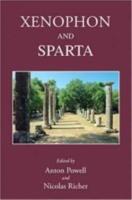
The Classical Press of Wales (2020) h/b 378pp £65.00 (ISBN 9781905125371)
As P. reminds us in his introduction, ‘probably more than any other major writer of classical Greece, Xenophon knew about Sparta from close experience’. Whether serving with Spartans on Cyrus the Younger’s doomed campaign to Cunaxa, commanding them in their subsequent march to safety, or living among them—perhaps in Sparta itself, certainly in his estate at Skillous in Spartan hinterlands—he was well-placed to penetrate the ‘Spartan mirage’ and to critique and record the realities of life in that unique city-state. Yet, how trustworthy a source is he, and does he even (as J. Ducat asks provocatively in his excellent chapter, ‘Xenophon and the Selection of the Hippeis’) ‘really believe what he says’? Other known unknowns compound problems further: what was Xenophon’s intended readership? Why and when did he write certain works? What is the relationship between each of the elements of his Spartan-inspired quartet, The Spartan Constitution (Lac. Pol.), Agesilaus, Hellenica and Cyropaedia (long recognized as transposing aspects of Sparta onto a largely-fictional Persia)? And to what extent are Xenophon’s observations filtered through the lenses of his own experience (an Athenian aristocratic acolyte of Socrates, who served as cavalryman under the Thirty and was later exiled for fighting against his city) and of wider Greek history (not least Sparta’s gradual decline in the first half of the fourth century BC)?
Questions such as these lie behind many of the twelve chapters in this thought-provoking collection, not least the first (and longest) by P. himself, who through careful consideration of what Xenophon sometimes chooses to omit suggests that his priority was ‘not literary but political’ and that ‘as a knowledgeable partisan of Sparta … his writings were closer in purpose to the briefings issued to journalists, and thus to the public, by a modern Ministry of Defence in time of conflict. His historical texts were themselves “an operational matter”’.
Questions of omission and comparison are to the fore in other chapters, too: R. (‘The Lacedaemonian Model in Xenophon’s Non-Historical Works’), observing that ‘Xenophon always has Athens on his mind when he describes the politeia of the Lacedaemoinians’, shows how Xenophon draws parallels between Agesilaus (subject of his encomium) and Socrates; V. Azouly (‘Sparta and the Cyropaedia’) compares Cyropaedia and Lac. Pol., suggesting that Xenophon is advising how Sparta must act to reverse her decline; N. Humble uses a comparison with Hellenica to suggest that, while Agesilaus is encomiastic, Xenophon was no blind hero-worshipper of the Spartan king. Other chapters explore Xenophon’s portrayal of Lycurgus (another mirror for Socrates and perhaps for Xenophon himself, argues E. David) and his laws (in a useful comparison with other poleis’ laws by V. Gray); another (by T.J. Figueira) Xenophon’s (limited) response to Spartan economy; while in an engagingly readable discussion (‘Foxes at Home, Lions Abroad: Spartan Commanders in Xenophon’s Anabasis’) E. Millender notes how, despite his admiration for Sparta, Xenophon paints the generals and governors as homoioi in name alone, similar only that each is ‘duplicitous, divisive, and deadly’. In short, this collection highlights Xenophon’s ambivalence towards Sparta, his apparent admiration for her constitution tempered not least by first-hand experience of Spartan leadership abroad (in the pressure-cooker world of the Anabasis), her wider foreign policies (for example her seizing of Thebes’ Cadmeia) and her decline (e.g. in Hellenica).
With notes and full bibliographies accompanying each chapter, together with an excellent index, this latest volume in CPW’s ‘Sparta and Its Influence’ series is probably one for the specialist. Certain chapters are dense in style, and while most Greek passages are translated into English, words and phrases are sometimes not. For students of Xenophon, Sparta or both, however, it will prove an invaluable addition to the library shelves, and one that whets the appetite for forthcoming companion volumes on how Thucydides, Plutarch and Herodotus responded to Sparta and the Spartans.
David Stuttard
